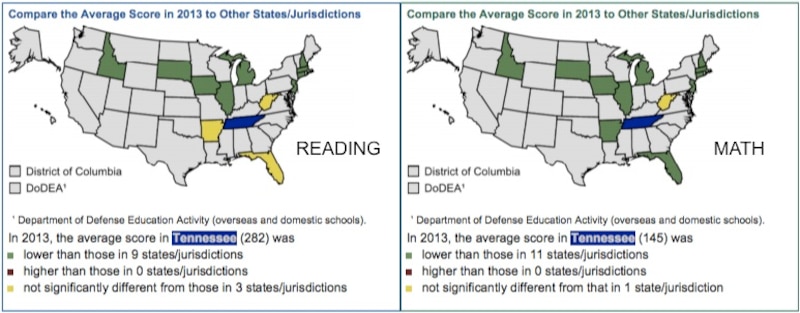
High school seniors in Tennessee are below average in reading and math, according to the state’s first showing on a 12th-grade version of the test known as the “nation’s report card.”
Just 17 percent of Tennessee 12th graders tested as proficient or advanced in math and 31 were proficient or advanced in reading on the exam, known as the National Assessment of Educational Progress. Across the country, 24 percent of 12th graders were proficient or advanced in math and 36 percent tested as proficient or advanced in reading.
“This should be a reminder to everyone working with high schoolers that we just graduated a class of a large number of kids, many of whom were not ready for postsecondary education,” said state education commissioner Kevin Huffman. He said the results underscored the need to prepare students to take advantage of the Tennessee Promise, the state’s new plan to cover the costs of two years of college for all students.
The assessment, administered in 2013, is part of the same testing program that earlier this year showed that Tennessee fourth and eighth graders had made the largest gains in the country. State officials cited those scores as proving that recent policy changes, including the introduction of new academic standards and a tougher teacher evaluation system, were paying off.
The high school results don’t show change over time, because 2013 was the first time that Tennessee agreed to have its 12th grade scores released publicly. (A sample of high school seniors in all 50 states took the exams, but only 13 states agreed to reveal their scores.)
Still, the scores offer a snapshot of where Tennessee students stand in comparison to their peers in other states — and how much ground the state must cover if it is to reach state and local education officials’ goal of ensuring that all high school graduates are prepared for college or the work world.
While fourth and eighth graders in the state scored at or close to the national average in reading and math, 12th graders are performing well below, according to NAEP. And while the state’s graduation rate has shot up 17 points in the last decade, 13 percent of students still do not graduate, meaning that the 12th-grade results are based on a student population that has likely already lost many of its lowest performers.
Huffman said the scores suggest that reforms are taking time to trickle up to the high school level.”The kids who left high school last year spent many years in the public school system before any of the major changes that have helped improve things went into effect,” he said. “We’re hopeful that we’ll see scores rise in next couple years.”
But he said the state must still boost the quality of its high schools and get more students enrolled in Advanced Placement college-preparatory courses. “It also may mean our high schools have not improved as much as they need to,” he said about the new scores.
Nationally, student scores in both math and reading at the 12th grade level remained flat between 2009 and 2014. In a statement, U.S. Secretary of Education Arne Duncan expressed concern about “educational stagnation” about racial achievement gaps, which also have not changed over time.
The size of Tennessee’s achievement gaps mirrored the national average. The scores also showed that Tennessee’s Hispanic students were lower-performing in math than their counterparts in any other state.
“We project that our nation’s public schools will become majority-minority this fall — making it even more urgent to put renewed attention into the academic rigor and equity of course offerings and into efforts to redesign high schools,” Duncan said.
Those redesign efforts include a federal competition to spur high schools to make their work more engaging, something that the NAEP findings suggested could be related to student achievement.
Students who took the NAEP exam also answered questions about their academic work and their opinions about school. High-scoring students were more likely to have taken calculus, to say they find their work engaging, and to talk about what they are reading almost every day. While low-scoring students said they found their academic assignments challenging, they were much less likely to say they found the work engaging or enjoyable.
Critics say NAEP’s 12th-grade results should not be trusted because high school seniors are savvy enough to know when a test does not matter and adjust their effort accordingly. But the organization that administers the exam says it is confident in the 12th-grade scores.


